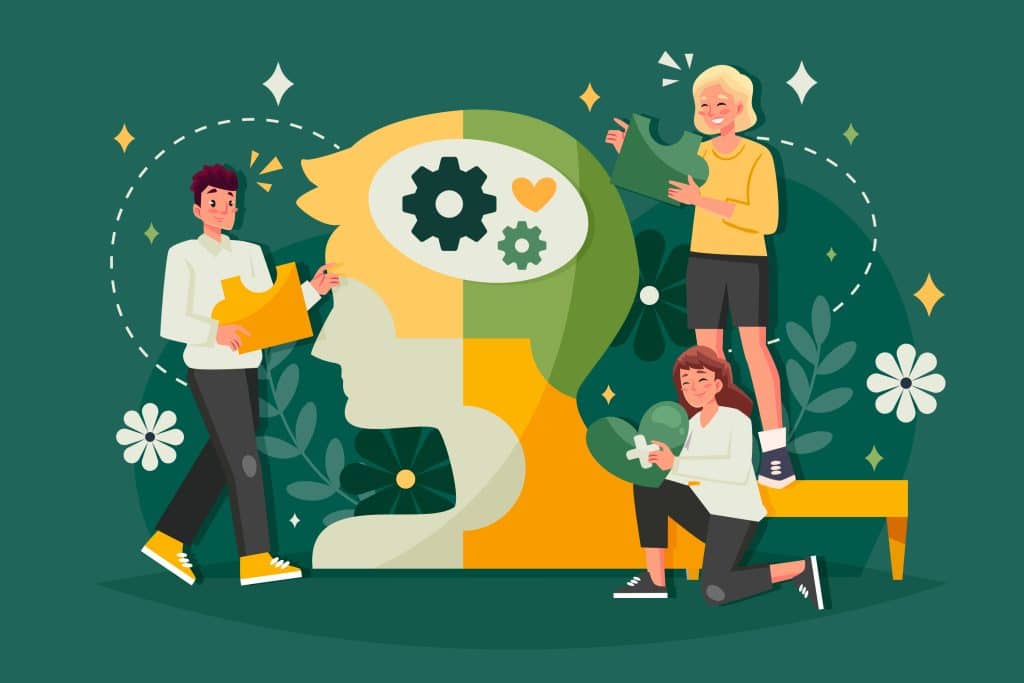Why Focusing on Mental Health Leads to Personal Growth
Ella Knight August 12, 2025
In recent years, the conversation around mental health has evolved. What was once a taboo topic is now being openly discussed. Mental health is no longer viewed as simply the absence of mental illness, but as a crucial element of overall well-being. As more people focus on their mental health, they realize its direct link to personal growth.
Focusing on mental health provides a foundation for growth in various aspects of life, from relationships to career development. By enhancing emotional resilience, fostering self-awareness, and breaking through limiting beliefs, mental well-being contributes significantly to personal growth. This article explores why mental health is essential for personal development and highlights the emerging trends that are shaping this movement in 2025.

The Link Between Mental Health and Personal Growth
Personal growth involves ongoing self-improvement and reaching one’s full potential. Mental health plays a significant role in this journey. When we take care of our mental well-being, it becomes easier to develop emotionally, mentally, and socially. Here’s how focusing on mental health enhances personal growth:
1. Emotional Intelligence and Self-Awareness
Emotional intelligence (EI) refers to the ability to recognize, understand, and manage our emotions, as well as the emotions of others. A key component of EI is self-awareness, which is essential for personal growth.
- Mental Health and Emotional Awareness: Focusing on mental health helps individuals become more attuned to their emotions. Practices like mindfulness and therapy allow people to identify their feelings without judgment. Increased emotional awareness leads to better emotional regulation, fostering personal growth.
- Improved Relationships: As emotional intelligence grows, individuals find it easier to communicate effectively and empathize with others. These skills are crucial for nurturing meaningful relationships and personal development.
2. Resilience and Coping Skills
Mental health plays a central role in how we respond to stress and adversity. Building mental resilience—the ability to recover from setbacks—promotes personal growth and success.
- Developing Resilience: Focusing on mental health equips individuals with strategies to manage stress and bounce back from difficulties. Techniques like meditation, regular exercise, and therapy are proven to improve resilience.
- Learning from Challenges: Mentally healthy individuals are more likely to view setbacks as learning opportunities. This resilience builds confidence and encourages continuous self-improvement, a key aspect of personal growth.
3. Overcoming Limiting Beliefs
Limiting beliefs are mental barriers that prevent people from reaching their full potential. They often arise from past experiences, societal pressures, or negative self-perceptions. Prioritizing mental health can help individuals challenge and overcome these barriers.
- Identifying Negative Thought Patterns: Mental health practices, such as cognitive-behavioral therapy (CBT), help individuals recognize and challenge negative beliefs. By addressing these thoughts, they can open themselves up to new opportunities for growth.
- Boosting Confidence: As individuals work on their mental health, their self-esteem improves. Increased confidence allows them to take on challenges, set higher goals, and push past previous limitations.
4. Better Decision-Making and Goal Setting
Mental health supports clear thinking and rational decision-making. When we are mentally healthy, we can make better choices that align with our goals and aspirations.
- Clarity and Focus: Focusing on mental health helps clear the mind, reducing stress and mental clutter. This clarity aids in sound decision-making, leading to better life choices and personal growth.
- Achieving Goals: A strong mental state allows individuals to stay focused on their goals. They can manage distractions and obstacles, leading to greater success and satisfaction in personal development.
Emerging Trends in Mental Health and Personal Growth for 2025
As awareness of mental health continues to rise, new trends are emerging that directly impact personal growth. Let’s explore some of these trends shaping the landscape in 2025:
1. Mental Health Integration in Workplace Culture
In 2025, more companies are integrating mental health support into their workplace culture. Recognizing that mental health affects employee productivity, satisfaction, and personal growth, businesses are offering programs that support mental well-being.
- Employee Wellness Programs: Many companies now offer mental health resources such as counseling, stress management workshops, and mindfulness programs. These initiatives help employees maintain a healthy work-life balance and support their personal growth.
- Improved Productivity and Growth: When employees feel supported mentally, they perform better in their roles, set higher goals, and achieve greater success. A healthy workforce is essential to an organization’s success and individual personal growth.
2. Teletherapy and Online Mental Health Resources
Teletherapy has become increasingly popular, especially in the wake of the COVID-19 pandemic. The rise of online platforms for mental health support is making therapy more accessible, affordable, and convenient for people worldwide.
- Accessibility: Teletherapy allows people to connect with licensed therapists from the comfort of their homes. This removes barriers like transportation, cost, and stigma, making mental health care more accessible to those in need.
- Self-Help Apps: Mental health apps, like Headspace and Calm, offer mindfulness and meditation exercises to help users improve their mental well-being. These tools can guide individuals toward personal growth by helping them manage stress, anxiety, and focus better.
3. Mindfulness and Meditation for Personal Growth
Mindfulness and meditation are becoming more widely practiced as tools for improving mental health and facilitating personal growth. These practices help individuals stay present, manage emotions, and increase self-awareness.
- Popular Meditation Apps: Apps like Calm, Insight Timer, and 10% Happier have made it easier for people to incorporate mindfulness into their daily routines. Research shows that mindfulness practices reduce stress, improve focus, and boost emotional regulation.
- Personal Growth through Meditation: Regular meditation helps individuals develop a deeper understanding of themselves, which is essential for personal development. It enhances self-awareness, improves mental clarity, and cultivates a calm and focused mindset.
4. Mental Health Education and Awareness
Mental health education is gaining momentum, with more individuals seeking knowledge about how mental well-being impacts personal growth. Workshops, seminars, and online courses are helping people learn about mental health and its importance in achieving personal development.
- Workshops and Seminars: Many communities, schools, and organizations are hosting educational events to raise awareness about mental health. These events help reduce stigma and provide individuals with tools for maintaining mental well-being.
- Increased Empowerment: With greater awareness, individuals are empowered to take control of their mental health, seek help when needed, and actively pursue personal growth.
How to Prioritize Mental Health for Personal Growth
If you’re looking to improve your mental health as a means of fostering personal growth, here are some practical steps to get started:
1. Practice Mindfulness Daily
Make mindfulness a daily habit. Spend a few minutes each day focusing on your breath, practicing gratitude, or simply being present in the moment. These simple exercises can significantly improve emotional regulation and self-awareness, which are key components of personal growth.
2. Seek Therapy or Counseling
Therapy can help you work through past trauma, current challenges, and long-term goals. A licensed therapist provides a safe space to explore emotions, build coping strategies, and gain insights into areas that may hinder personal growth.
3. Set Clear Personal Development Goals
Identify areas of your life you want to improve. Whether it’s emotional intelligence, communication skills, or confidence, setting clear goals allows you to track your progress and stay motivated.
4. Engage in Regular Physical Activity
Physical health and mental health are interconnected. Regular exercise helps reduce anxiety, boost mood, and improve overall mental well-being. By staying physically active, you support both your physical and personal growth.
Conclusion
Focusing on mental health is not just about addressing challenges—it is a powerful tool for personal growth. When you prioritize mental health, you develop emotional intelligence, resilience, and a clear mindset that supports self-improvement. Whether it’s through mindfulness, therapy, or setting growth goals, mental well-being is the foundation of a fulfilling and successful life.
As we continue into 2025, the conversation about mental health and personal growth will only become more significant. By embracing mental health practices, we can unlock our true potential and pursue continuous personal development.
Reference
- Teletherapy and Online Mental Health Resources- https://www.betterhelp.com/
- Mindfulness and Meditation for Mental Health- https://www.headspace.com/
- Workplace Wellness Programs- https://www.apa.org







